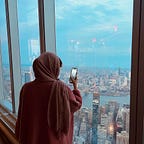Walking into a small bookstore in the Village is an anomaly in itself. There are so many to choose from on nearly every corner, some niche, some secondhand. Each delivers a unique experience that you could not find elsewhere yet masters an aura of familiarity that could make anyone feel at home. The door chimes and floor creaks make you wonder if Mark Twain himself wandered through the aisles, no matter how new the business could be. Tall, alphabetized shelves tower over you, but that doesn’t really matter. You can’t find what you need without taking in everything around you. These small bookstores define organized chaos. It’s like walking into a personal library, open for your perusal.
It is surprising that physical books have not become obsolete in an increasingly digital culture. According to a market analysis conducted by Grand View Research, online book services are expected to grow at a rate of 5.8 percent by 2027 globally, indicative of a growth in digital readership. Researchers accredit this development to a general desire for convenience, especially in educational settings where, even before the pandemic, educators provided material that is almost always available online. Additionally, the push for a more paperless lifestyle should influence a decline in the popularity of purchasing physical copies of books. However, human practices don’t seem to align with these expected shifts in consumer behavior.
Book-lover Jasmine Venet, an English major at NYU, never hopped on the e-book bandwagon.
“I don’t read e-books. I enjoy the feeling of holding a book in my hand and being able to flip the pages. E-books can’t replicate that sensation. Nothing really can. It’s a tangible thing that I don’t think will ever die out,” said Venet.
Despite the ever-lasting appeal of owning physical copies of books, there is no denying that small independent bookstores have suffered from the advent of Amazon. Several have had to hustle to survive in creative ways through a changing consumer landscape and through a two-year disruption in the form of a global pandemic. Data from the American Booksellers Association confirms that by October of 2020, at least one independent bookstore shut down each week since the pandemic began. To stay in business before mass vaccination and lifted restrictions, local booksellers worked hard to incorporate mail-orders and curbside pick-up services to overcome severe economic losses.
Outside of the threat of e-commerce, independent bookstores remained vulnerable on another front. Large retail bookstores (like Barnes & Noble) served as their stealthiest competition. While Barnes & Noble also experienced a significant dip in sales in the post-Amazon era, as of last year book sales at the chain were up 14 percent. Barnes & Noble remains an attractive option for bookstore frequenters. It has the luxury of space and avid resources to help sustain the physical book industry, which, despite the rise in digital formats and accessibility, brings 76 percent of publishers’ sales revenue.
Because of this, there is no evident reasoning as to how independent bookstores have managed to sustain themselves as a niche location for book-lovers. These businesses stayed afloat through turbulent times while representing an endangered industry.
Left Bank Books in the West Village is just one example of an indie bookstore that managed to do just that. Left Bank Books (LBB) stores a tightly curated selection of books, magazines, and ephemera from books bought from private people within the Village, reflecting the neighborhood’s taste, history, and sensibility back to it.
Erik DuRon, one of the store’s owners, recounted that at the onset of the pandemic, LBB had to shut down for four months before re-opening with curtailed hours and abiding by all health and safety guidelines and protocols. The holiday season was more of a return to normalcy for the store owners but with an added arsenal of learning how to navigate unforeseen situations.
According to DuRon, maintaining a digital space during the pandemic played a significant role in the business’s survival, such as regular communication with subscribers through a mailing list, with other added efforts.
“I rode the train to the shop once a week to process, pack, and ship orders and also delivered books once a week to our cataloger so she could write descriptions, picking up the last batch each visit. We have a great, regular clientele and they really showed up for us during this period,” said DuRon.
DuRon takes pride in his “very local, community-sustained business” and is on a first-name basis with most customers (and their dogs!). Though the store is just about three years old, Amazon has not impacted the specialty bookstore in a meaningful way.
“Funnily, at one point during lockdown I came into the shop to find that someone had written ‘overpriced books’ on the sign we put on our gate directing people to our website. Rather than getting mad and throwing it away, I wrote ‘Go buy on Amazon then, punk’ below and left it in place,” said DuRon.
So what explains the charm of independent bookstores over other, potentially more convenient options?
Venet, a regular indie bookstore frequenter, understands it completely.
“I enjoy the sense of community in an independent bookstore. I like the idea of supporting a small business over a large corporation, like Barnes & Noble or even buying on Amazon,” said Venet.
“In general, people who truly care about books, and the artistic and intellectual values they represent, want real interactions,” said DuRon, echoing her sentiments. “These same people also care about sustaining a viable street culture, with small, unique businesses as the backbone, in the places where they live.”
